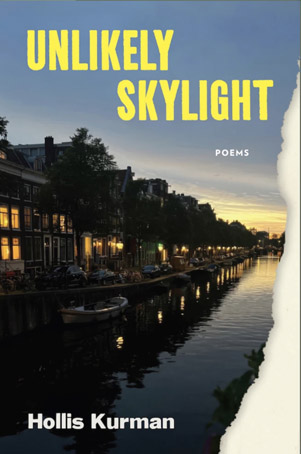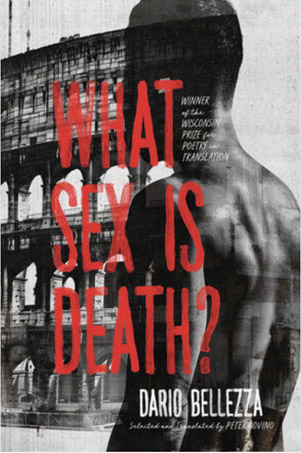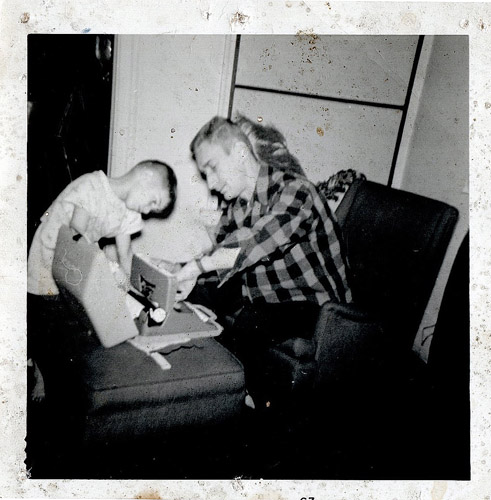Bryan R. Monte
AQ43 Summer 2025 Book Reviews
Bellezza, Dario. What Sex is Death?, Covino, Peter, translator, (The University of Wisconsin Press, 2025), 978-0-299-35034-5, 199 pages.
Kurman, Hollis. Unlikely Skylight, (Barrow Street Press, 2025), ISBN 978-1-962-13110-0, 76 pages.


For this reading period, I received two books which are related in origin due to their authors and publishers and also to me. To provide transparency, I’d like to indicate that I first met poet Hollis Kurman at Amsterdam Quarterly’s 2023 Yearbook launch party and reading held at the American Book Center in Amsterdam in January 2024. At the time, she asked me if I knew Peter Covino. I said I didn’t, so she gave me his email address as well as hers.
Months drifted by before I actually contacted Kurman, but not Covino. (That wouldn’t happen for another year). This might have been because I was busy putting Amsterdam Quarterly’s (AQ39) spring 2024 issue online, which included an email interview with Timothy Liu, conducted the previous autumn. In what turned out to be a coincidence only possible in a three-volume, 19th century English novel. (yes, I am making a The Importance of Being Earnest reference here), we were all directly connected or by only one degree of separation, even though I wouldn’t realize this for several months. It turned out that Covino and his Barrow Street Press is not only the publisher of Liu’s most recent poetry book, Down and Out and Lowdown, Timothy Liu’s Bedside Bottom-Feeder Blues but also one of Kurman’s poems ‘Inventory’, in the very first issue of Covino’s Barrow Street Journal, a poem which also appears in her debut collection, Unlikely Skylight, also from Barrow Street.
Unlikely Skylight is an unforgettable poetry collection about subjects such as family, fidelity, dementia, the Holocaust, war, the death of a sibling, parent, or partner, traumatic brain injury, migrants, and even birds and dance. Kurman’s poetry is richly descriptive, engaging, challenging, inspiring, and concerned with past and present and the personal and the historical. Its poems are set in places such as art museums, Amsterdam’s grey skies and canals, a Manhattan cocktail party, the seaside, hotel rooms, hospitals, clinics, and war zones in Ukraine, The Netherlands, Poland, Spain, the UK, and the US.
Kurman’s collection derives its title from its use in the poem, ‘Waste’. Here ‘skylight’ is used thrice exclusively to describe a Rijksmuseum reception in its enclosed, glass-roofed atrium. The poem mentions how the light it lets in catches a grieving widow’s loss, described by the shadow space she carries, symbolised in the poem’s terminal stanza by the image of ‘The back of her dress, zipped not quite / to the top, missing a second set of hands / to consummate the pull or to take out the garbage.’
As mentioned above, her poem’s take place in various international settings—from green parakeets escaped London Zoo terrorizing indigenous ones in ‘Screech’, to songbird-killing hawks and an unassertive artist at a cocktail party in New York City in ‘Unpopped’, and ‘Working the Room’, to her especially chilling portrayal of children experiencing PTSD in a war zone in ‘Ask Children’:
They know boot crunch from tank whir, missile whistle from rocket whine.
They can count seconds to boom and brazen light bursts, the broken nights.
They can nod off to anthems, echoed tunnel cries, blast-bitten lullabies.
As indicated by the above, Kurman’s poetry is also politically aware. In ‘Ocean Road’ she describes an immigrant landscaper’s hope of a life he has built and wants to share with his sister, America’s political composition, (‘Omlet Nation’) its new order (‘State of the Union’) and its disasters (‘Body Counts’).
Kurman also presents an inventory of bodily organ failures in her poem ‘Life Sentence’ in the style of a British murder mystery with a nod to the board game Clue/Cluedo as well: ‘The Brain / with the Candlestick / in the Conservatory // The Lung / with the Lead Pipe / in the Library.’ Her struggle recovering from a chronic brain injury is depicted in ‘Walking Wounded’, ‘Next Time’, and in ‘Shifting Gears’ especially:
The accident has made of her your old bike, beloved &
only ride, gear shifts unsteady, occasional tension spoke
requiring realignment, night lighting…
Kurman also broaches the subject of an ageing relative’s Alzheimer’s in ‘Vanishing Point’.
Unlikely Skylight also demonstrates Kurman’s poetic range with concrete poems and poems whose lines spread out across the page, similar to William Carlos Williams’s variable foot. One concrete poem, shaped like a single wedge wing, is ‘Missing’, about loss more generally, grieving the loss of a loved one, as well as the vanishing of song birds. Another duo-winged-shaped poem is ‘Body Counts’ about the Covid pandemic. It is a visual memorial to those who died. Its two floating stanzas contrast shared national and international disastrous political events with the lasting, personal health effects of Covid:
When this is over if it ends there will be no
where were you when …
There will be
how much living did you lose,
A third poem, ‘Still. Here.’, which has slender lines, is shaped vertically top to bottom like a dancer and is dedicated to Bill T. Jones.
In addition, Kurman’s lines sometimes have surprising twists or turns, such as ‘Right This Way’, whose title sounds like a carnival barker’s greeting. It begins as a nature poem describing beetles joining together to form rafts to save themselves from water, then refers to a Willy Coyote/Road Runner cartoon, and ends with a shocking description of the perception of those about to be gassed in the Holocaust:
Jews heading into Showers,
holding hands, for that single
shiny moment believing
they’d come out
clean.
‘Water for Demeter’ and ‘Agamemnon, in Ontario’ retell classical myths in contemporary settings. The latter was inspired by an egregious honour killing in Canada and a Greek myth. It interweaves the two violent stories, one from mythology and one from current events. It opens with: ‘No God warned you to cover your tracks / pull that car and its booty out of the cold canal.’ Kurman details the destruction wrought by Agamemnon and the war: ‘Ten of us set out. Only six returned,’ and she concludes ‘Not one of you will make it, now, to Niagara Falls, / to Heaven or Home, or to Troy. No Betrayal more than this.’ In addition, Unlikey Skylight’s Notes section provides a helpful historical and mythological information for some of Kurman’s poems. Overall, I think Unlikely Skylight is a very inspired debut poetry collection and I highly recommend it to AQ’s readers.
The second book I’d like to mention is Dario Bellezza’s poetry collection, What Sex is Death?, poems selected and translated from the original Italian by Peter Covino, who was the winner of the prestigious 2025 Wisconsin Prize for Poetry and Translation. To those unfamiliar with Bellezza, this bilingual edition (Italian and English on facing pages) comes with a well-researched, 17-page introduction and an eight-page bibliographic appendix. What Sex Is Death’s? poems date from 1971 to 1996 and mark Bellezza’s development from a poet of outrage and scandal in the ’70s (he won the Viareggio prize for his second collection, Morte segreta (Second Death), to experimentation with poetic forms in the ’80s (including journaling, serial poems, and animistic references, (he was an especial cat lover), to a frank portrayal of living with AIDS in the ’90s. This book contains selections from the seven books published during Bellezza’ lifetime, plus one published posthumously.
The book’s title poem, ‘Quale Sesso ha la Morte?’ (‘What Sex is Death?’) is the first and title poem of this first section taken from his 1971 collection, Inventtive en licenze (Invective and license). Its opening is mythic as well as frank.
Con quale sesso mi verrai incontro? With what sex will you meet me?
Se Orfeo scalmanato non mi riguarda if hotheaded Orpheus ignores me
E Euridice era un troia infingarda? And Eurydice was an idle streetwalker?
Addio scemenza mia trangugiata Goodbye to my quickly gulped down
In tutta fretta dentro una fratta, stupidity among the thickets,
Despite English being rhyme poor compared to Italian, Covino is able to replicate some of the poem’s rhythm and rhymes, reproduce the guttural sound of a man swallowing semen, as well as preserve Bellezza’s contemporaneous reference to the mythic. It is this nexus of the ancient, mythic, and modern that is one of the hallmarks of Bellezza’s poetry. This is reinforced by the image of Rome’s Colosseum on the book’s cover and its repeated reference in his poems.
Bellezza also pays tribute to the modern lights of Italian literature and film who influenced him. The second poem in his first collection is ‘To Elsa Morante’ a children’s author, poet, and novelist, whose novel, La Storia (History) was a literary sensation that was made into a film of the same title by Luigi Comencini in 1986, a year after her death. La Storia is about a Jewish woman living in Rome during and after the WWII. It thematically depicts history as one unending scandal and theatre of cruelty which leads to the death of both her sons and to the protagonist’s final breakdown into a state of catatonia. The first two lines of this poem about the rich and powerful begin with:
I ragazzi drogati, guardie del corpo The drug addicts, bodyguards
sell’Assoluto, vanno per il mondo of the Absolute, roam the earth.
Later in this poem, Bellezza mentions also: ‘their graceful, fallacious way of lying’ and later ‘their puerile play / is vain chaos diabolical pride’ as prophetic as if they were written today and not in 1971.
In addition, Covino demonstrates his skill by how he translates the first two lines of the next poem, ‘To Pier Paolo Passolini’, one of Bellezza’s other influences. Covino takes Bellezza’s first two lines:
‘M’aggiro fra ricatti e botte e licenzio / la mia anima mezza vuota e peccatrice’
which translates literally as:
‘I wander between blackmail and beatings / and I dismiss my soul half empty and sinful’
which Covino translates into something more poetic and compact, and by doing so, also creates more powerfully rhythmic alliterations:
‘I’m surrounded by blackmail and beatings / I dismiss my half-empty and sinful soul.’
Unfortunately, I can’t go into an in-depth analysis of many more of Bellezza’s other poems in this book, but his subjects include: the cinema, gay sex, politics, prostitution, and of course, his cat obsession (Bellezza was a passionate cat rescuer, who took in many strays). However, I would like point out two more poems from his middle and the last collections published during Bellezza’s lifetime. In his poem ‘La Gattita’ (‘Catness’) in la Gatta from his book io (1983), midway in his poetic career, Bellezza imagines the:
Dura legge sapere che niete Harsh law to know nothing
potra consolare il niete assoluto will console the absolute void
che ci divora lontano dal mare that devours us far from the sea
Incredibly just a few lines later after this dismal awareness, Bellezza weaves in a brief reference to the hopeful, revelatory, Biblical story of Jacob’s ladder, only to use it as a fleeting, straw man to an eternal non-existence:
Pietre, pietre, sconnesse Stones, stones, severed
da secoli non piu a venire by centuries no longer to come
ma venuti. Pietre but past. Stones
dure, energiche maschili strong, energetic, man’s
che mi coprirete that cover me
non nel linciaggio finale not as a final lynching
ma nel dolce sonno del niete but in the sweet sleep of the void
This nihilism continues through this collection, even in his last book L’avversario / The Adversary, published in 1994. In his poem ‘Gatti’ / ‘Cats’, Bellezza reflects upon these rescued companions, who he refers to as ‘prisoners of love’, because he keeps them ‘in two solitary damp rooms / where I lock you in when I leave / for my nights of sinister galas.’ In the next stanza he states: ‘I’m not Leopardi, after all / nor Cavafy. Who am I / then?’ and posits that ‘(“a poet = / “a buffoon”) / about whom / one could certainly object / since nothingness and everything / are exactly the same—’. Perhaps this personal assessment was too harsh. Covino’s translation of the poems Bellezza left behind certainly makes this seem so. AQ





